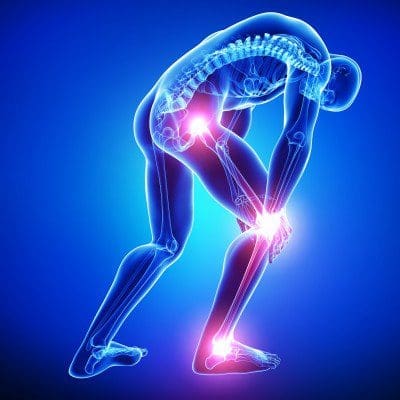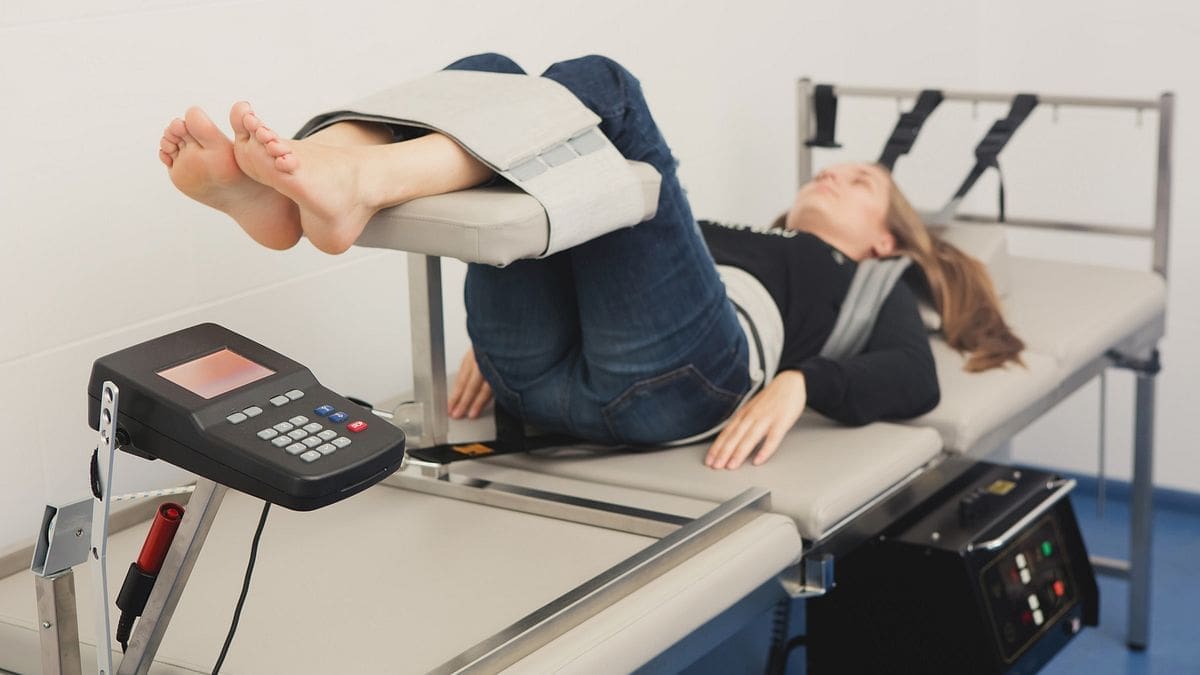Table of Contents
Introduction
The body can bend, twist, turn, and move without pain, while the spine allows the body to be held upright. When the body gets injured, and the spine starts to feel pain from the ligaments, the nerve root, the spinal discs, and the spinal cord, it can cause either leg pain, back pain, or both depending on the severity. The pain can range from a dull, mild ache to a sudden, sharp shooting pain that can radiate from the leg to the feet. Luckily there are many treatments to help alleviate lumbar pain and can bring back a person’s quality of life. In this article, we will be looking at what leg pain is, its factors, and its symptoms, as well as how decompression can relieve leg pain for many individuals. By referring patients to qualified and skilled providers specializing in spinal decompression therapy. To that end, and when appropriate, we advise our patients to refer to our associated medical providers based on their examination. We find that education is the key to asking valuable questions to our providers. Dr. Alex Jimenez DC provides this information as an educational service only. Disclaimer
Can my insurance cover it? Yes, it may. If you are uncertain, here is the link to all the insurance providers we cover. If you have any questions, please call Dr. Jimenez at 915-850-0900.
What Is Leg Pain?
Ever wonder, “why are my legs aching so much?” or “my legs can’t stop twitching even when I am sitting down?” How about feeling a sharp pain from the buttock down to the back of the leg to the feet. This is known as leg pain, and research shows that leg pain can be intermittent or constant in the body. Not only that, but leg pain can have a range of sensations, from a dull ache to a throbbing, burning sensation that travels the leg itself. Now many causes can contribute to leg pain, and it usually starts in the lower back, the pelvis, or even the leg itself. Some of the common causes include:
- Spinal nerve compression or irritation
- Spinal cord compression
- Pelvic and hip problems
The Symptoms & Factors Of Leg Pain
As stated earlier, one of the causes contributing to leg pain is low back pain. Research studies have noted that around 60% of individuals with low back pain have also suffered leg pain. When leg pain is associated with low back pain, it is known as radicular pain. Leg pain can also affect the spinal nerve root involvement, and other research studies have found that low back-related leg pain is one of the most common variations of low back pain and can contribute to sciatica. Some of the symptoms that individuals are experiencing with leg pain include:
- Leg weakness due to the lumbar or sacral spinal nerve being compressed
- Sciatica
- Pins and needles sensation
- Numbness from prolonged sitting or standing
- Excruciating back pain
Decompression Therapy For The Lumbar Spine-Video
The video above shows how non-surgical decompression is used for the lumbar spine and can help alleviate a wide variety of issues that are not only affecting the back but can also alleviate other symptoms that are associated with low back pain like sciatica, herniated discs, and leg pain to name a few. What decompression therapy does to the individual is that it utilizes traction by gently stretching the spine allowing the compressed spinal discs to relieve themselves and stop touching the nerve roots spread out from the spine. This causes relief to many individuals that are suffering from sciatica and leg pain that is associated with low back pain. When the spine is being decompressed, the beneficial nutrients rehydrate the spinal discs and increase their disc height, allowing a person to get back their quality of life. If you want to learn more about spinal decompression therapy, this link will explain the benefits of spinal decompression and how it can alleviate low back pain symptoms.
Decompression Therapy Can Relieve Leg Pain
As stated earlier, the questions of “Why are my legs aching so much?” or “Why can’t my legs stop twitching when I am sitting down?” or even feeling a sudden sharp pain that runs from the lower back down to the leg have been searched all over the internet. The search results have stated that this is due to leg pain. How about treatments for leg pain? Most of the results show that light stretches, leg surgery, or taking pain medication can help; however, non-surgical treatments can help alleviate leg pain, and that is by utilizing decompression therapy.
Research studies have found that low back pain is one of the most common musculoskeletal disorders and that leg pain is associated with low back pain causing radicular symptoms. The lumbar spinal nerve roots are compressed when this happens, causing a burning, electric sharp pain that affects the back and legs. With decompression therapy, it allows the individual to feel the gentle stretch on their spine, causing a reduction in the intra-disc pressure and disc protrusion while also increasing the disc space and improving leg mobility. Other research studies have also found that the combination of both manual and spinal decompression therapy can help decrease the internal pressure of the intervertebral disc while increasing its height and taking pressure off the nerve root that is causing pain to the lower back and the leg. Decompression therapy also helps rehydrate the spinal discs and extend the annulus fibrosis and posterior ligaments to alleviate nerve root adhesion and disc herniation.
Conclusion
When the body is suffering from an injury that starts to affect the back and leg, it can cause severe issues for the individual. The pain ranges from a mild, dull ache to a sharp, sudden pain that can radiate down the lower back to the leg. Therefore, leg pain is associated with low back pain as the compressed spinal discs affect the nerve roots that are spread throughout the entire body. When a nerve root is irritated or compressed on the legs, it can cause symptoms like sciatica to initiate a sharp pain running down the leg itself. Luckily treatments like decompression therapy can help alleviate leg pain in a non-surgical way by utilizing traction to gently stretch the spinal disc off the compressed nerve root to alleviate symptoms causing low back and leg pain. Incorporating decompression therapy as part of your wellness journey can provide tremendous benefits to becoming pain-free.
References
Amjad, Fareeha, et al. “Effects of Non-Surgical Decompression Therapy in Addition to Routine Physical Therapy on Pain, Range of Motion, Endurance, Functional Disability and Quality of Life versus Routine Physical Therapy Alone in Patients with Lumbar Radiculopathy; a Randomized Controlled Trial.” BMC Musculoskeletal Disorders, BioMed Central, 16 Mar. 2022, https://www.ncbi.nlm.nih.gov/pmc/articles/PMC8924735/.
Cooper, Grant. “Leg Pain and Numbness: What Might These Symptoms Mean?” Spine, Spine-Health, 30 Sept. 2019, https://www.spine-health.com/conditions/leg-pain/leg-pain-and-numbness-what-might-these-symptoms-mean.
Konstantinou, Kika, et al. “Characteristics of Patients with Low Back and Leg Pain Seeking Treatment in Primary Care: Baseline Results from the Atlas Cohort Study.” BMC Musculoskeletal Disorders, BioMed Central, 4 Nov. 2015, https://www.ncbi.nlm.nih.gov/pmc/articles/PMC4634730/.
Oh, Hyunju, et al. “Effects of the Flexion-Distraction Technique and Drop Technique on Straight Leg Raising Angle and Intervertebral Disc Height of Patients with an Intervertebral Disc Herniation.” Journal of Physical Therapy Science, The Society of Physical Therapy Science, Aug. 2019, https://www.ncbi.nlm.nih.gov/pmc/articles/PMC6698474/.
Stynes, Siobhán, et al. “Classification of Patients with Low Back-Related Leg Pain: A Systematic Review.” BMC Musculoskeletal Disorders, BioMed Central, 23 May 2016, https://www.ncbi.nlm.nih.gov/pmc/articles/PMC4877814/.
Disclaimer
Post Disclaimer
Professional Scope of Practice *
The information on this blog site is not intended to replace a one-on-one relationship with a qualified healthcare professional or licensed physician and is not medical advice. We encourage you to make healthcare decisions based on your research and partnership with a qualified healthcare professional.
Blog Information & Scope Discussions
Welcome to El Paso's Premier Wellness and Injury Care Clinic & Wellness Blog, where Dr. Alex Jimenez, DC, FNP-C, a board-certified Family Practice Nurse Practitioner (FNP-BC) and Chiropractor (DC), presents insights on how our team is dedicated to holistic healing and personalized care. Our practice aligns with evidence-based treatment protocols inspired by integrative medicine principles, similar to those found on this site and our family practice-based chiromed.com site, focusing on restoring health naturally for patients of all ages.
Our areas of chiropractic practice include Wellness & Nutrition, Chronic Pain, Personal Injury, Auto Accident Care, Work Injuries, Back Injury, Low Back Pain, Neck Pain, Migraine Headaches, Sports Injuries, Severe Sciatica, Scoliosis, Complex Herniated Discs, Fibromyalgia, Chronic Pain, Complex Injuries, Stress Management, Functional Medicine Treatments, and in-scope care protocols.
Our information scope is limited to chiropractic, musculoskeletal, physical medicine, wellness, contributing etiological viscerosomatic disturbances within clinical presentations, associated somato-visceral reflex clinical dynamics, subluxation complexes, sensitive health issues, and functional medicine articles, topics, and discussions.
We provide and present clinical collaboration with specialists from various disciplines. Each specialist is governed by their professional scope of practice and their jurisdiction of licensure. We use functional health & wellness protocols to treat and support care for the injuries or disorders of the musculoskeletal system.
Our videos, posts, topics, subjects, and insights cover clinical matters and issues that relate to and directly or indirectly support our clinical scope of practice.*
Our office has made a reasonable effort to provide supportive citations and has identified relevant research studies that support our posts. We provide copies of supporting research studies available to regulatory boards and the public upon request.
We understand that we cover matters that require an additional explanation of how they may assist in a particular care plan or treatment protocol; therefore, to discuss the subject matter above further, please feel free to ask Dr. Alex Jimenez, DC, APRN, FNP-BC, or contact us at 915-850-0900.
We are here to help you and your family.
Blessings
Dr. Alex Jimenez DC, MSACP, APRN, FNP-BC*, CCST, IFMCP, CFMP, ATN
email: coach@elpasofunctionalmedicine.com
Licensed as a Doctor of Chiropractic (DC) in Texas & New Mexico*
Texas DC License # TX5807
New Mexico DC License # NM-DC2182
Licensed as a Registered Nurse (RN*) in Texas & Multistate
Texas RN License # 1191402
ANCC FNP-BC: Board Certified Nurse Practitioner*
Compact Status: Multi-State License: Authorized to Practice in 40 States*
Graduate with Honors: ICHS: MSN-FNP (Family Nurse Practitioner Program)
Degree Granted. Master's in Family Practice MSN Diploma (Cum Laude)
Dr. Alex Jimenez, DC, APRN, FNP-BC*, CFMP, IFMCP, ATN, CCST
My Digital Business Card




